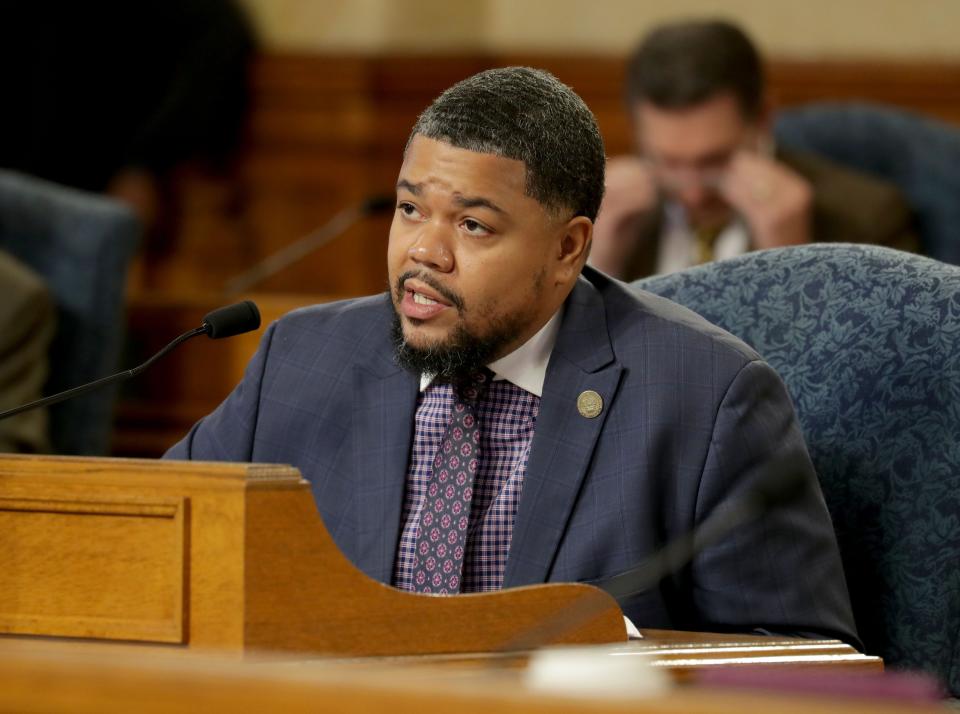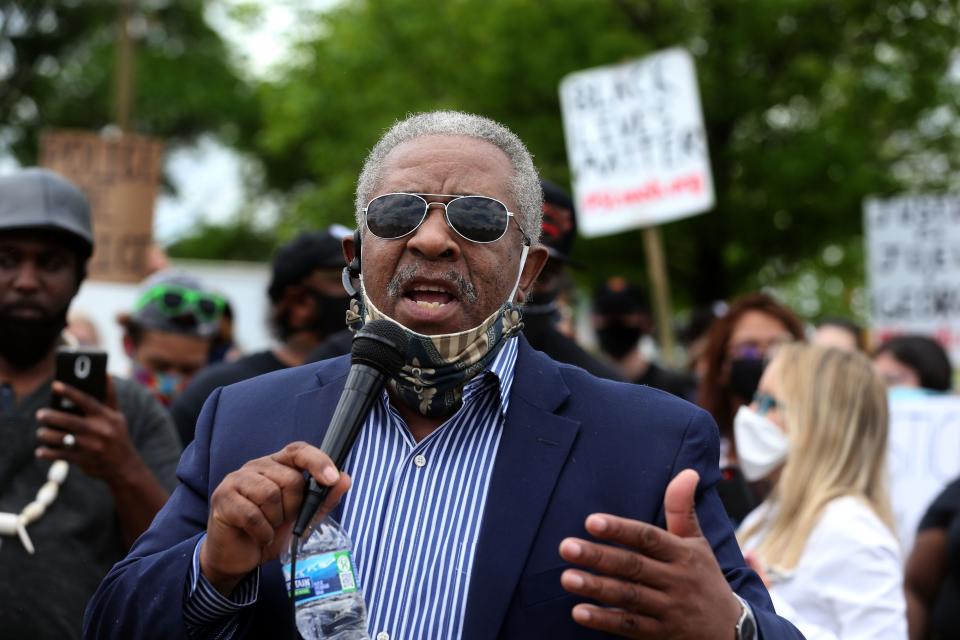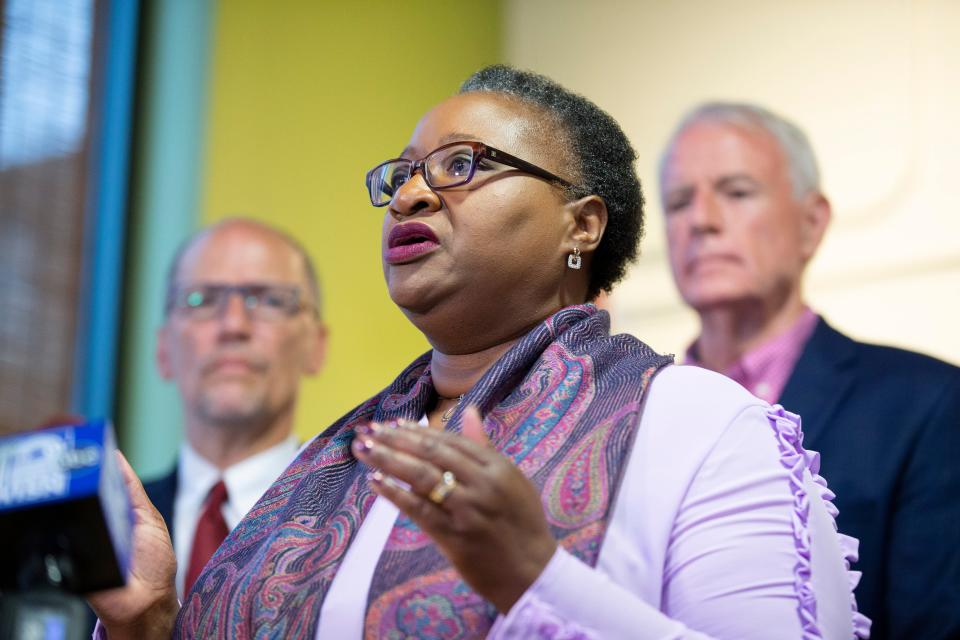'It's gut-wrenching': Electrical fires' impact on Black Milwaukee renters prompts action by Evers and other officials
This story was republished on Jan. 4, 2022 to make it free for all readers
Calling the situation horrific and inexcusable, city, county and state leaders said this week they are committed to doing what it takes to improve conditions that leave Black renters in Milwaukee far more vulnerable to electrical fires than anybody else in the city.
“These people paid for a place that ultimately took their lives,” said state Sen. LaTonya Johnson, D-Milwaukee, who represents part of the city most affected by suspected electrical fires. “That’s inexcusable. ... I have no choice but to find a way to get this addressed. I honestly didn’t know that people were literally losing their lives and everything they own like this.”
Johnson said she plans to reach out to Gov. Tony Evers’ office and work with colleagues in the Legislature to consider changes that could help tackle the problem.
The reaction follows a Milwaukee Journal Sentinel investigation last week that uncovered how suspected electrical fires disproportionately harm Black renters in the city’s most impoverished neighborhoods and how systems at all levels of government fail to address the underlying issues.
The investigation revealed that fire investigators with Milwaukee police and fire departments as well as the state fire marshal’s office do not thoroughly investigate suspected electrical fires — anywhere — and showed how the city’s Department of Neighborhood Services allows unscrupulous landlords with histories of extensive code violations to continue renting out their properties.

“It’s gut-wrenching,” Evers told the Journal Sentinel. “It’s very disheartening.”
Wanting swift action, Evers said he already has spoken to staff members about potential ways to address the problem, which he blamed largely on legislative changes in the last decade that weakened cities’ ability to hold unscrupulous landlords accountable.
“I will do whatever I can administratively,” he said. “But because these changes were laws and part of the legislative process, major changes need to happen in that arena.”
RELATED: Electrical fires hit Milwaukee's Black renters hardest. Nobody is held accountable.
Evers said lawmakers across the state should care deeply about what happens in Milwaukee, even when their constituents might not seem interested.
“Milwaukee is the economic engine of the state and that should mean legislators from northern Wisconsin and from western Wisconsin should care about what happens in Milwaukee,” he said. “I can’t imagine people in other parts of the state not taking this seriously.”

City Ald. Khalif Rainey said he's taking immediate action: He took the first steps Wednesday to initiate public hearings, including testimony from city officials.
“I’ve never fathomed that there were not any qualification components when it came to rental properties,” Rainey said, adding that he’s lived in many rentals and “always assumed the properties were approved for residency.”
Rainey called it unbelievable that Mayor Tom Barrett would not answer questions from the Journal Sentinel on the matter. “He’s always been laissez-faire on many of the issues that affect the quality of life for African Americans in Milwaukee,” Rainey said.
“Of all the issues we’re attempting to address here, whether it’s gun violence or reckless driving, this right here seems to be an issue where we can really make a difference," he said. "I really want to see City of Milwaukee step up and protect the people.”
'Dereliction of duty'
Barrett, who has been tapped to be ambassador to Luxembourg by President Joe Biden, again declined to speak with reporters about their findings, deferring to the city’s neighborhood services department.
“We are interested in any proposals and additional tools that we can use in new and innovative ways to better protect the citizens of Milwaukee,” Steph O’Connor, the department spokeswoman, wrote in an email.
Milwaukee’s city attorney, Tearman Spencer, called the circumstances and loss of life from electrical fires “a travesty.”
“We need to get all the parties at the table to discuss how to close those loopholes and hold these people more accountable,” he said.

Milwaukee County District Attorney John Chisholm and his staff are reviewing the issue of electrical fires, said Chief Deputy District Attorney Kent Lovern.
Lovern said they’d be examining the office’s previous successful prosecutions regarding landlord-tenant issues.
"We have some specific next steps we intend to take," Lovern said. Details would be forthcoming, he said.
Milwaukee County Supervisor Felesia Martin, whose district includes neighborhoods where the Journal Sentinel found the number of electrical fires higher, called the investigation’s findings “disturbing.”
“It appears to be a dereliction of duty and responsibility,” she said. “The alarms that this all reveals is just beyond comprehension.”
The Journal Sentinel’s investigation found that suspected electrical fires occur in Milwaukee’s 53206 ZIP code at five times the rate of the rest of the city. The neighborhood and areas surrounding it are the epicenter for electrical fire danger in the city, the newspaper found. About 95% of the residents who live in 53206 are Black, according to census data.
And while the data show that Black renters are most likely to be victimized by electrical fires, Martin wanted to make sure the leaders also look out for anyone who is poor and facing such danger.
“It is about people,” she said. “It is about the human lives being lost.”
Milwaukee once had several safeguards in place that helped detect dangerous wiring and other problems. But starting in 2011, a group of state lawmakers, some themselves landlords, dismantled the safeguards in a series of sweeping laws.
RELATED: Some Wisconsin lawmakers double as landlords — and have passed laws that undermine renters' rights
Martin said she is interested in working with lawmakers to restore those protections. But she said she’ll be cautious not to rush into a slew of knee-jerk changes just to “say we did this thing, raise the flag and balloons and have a parade.”
“We want to be thoughtful, methodical and strategic. No more rushing to get something out and slapping a Band-Aid on it,” she said.
She said renters should have access to an easily searchable database that discloses the history of properties. And she said it should not be the responsibility of renters to do complex electrical checks of a unit. Government inspectors should be doing that.
“I am just not going to let it go because this is too important,” she said.

Ald. Michael Murphy said Milwaukee’s inspection program, which was being paid for with fees on landlords, was effective, and the city was looking to expand the effort. The Legislature’s action “gutted it,” he said.
Murphy wants it restored. He also wants to see what the city could do to improve its oversight, including its data collection. He wants to hear testimony from Erica Roberts, the city’s commissioner of building inspection, and Fire Chief Aaron Lipski.
“I want to see what we can do to change what is in our control,” Murphy said, “We need better data to make better decisions.”
Heiner Giese, an attorney for the Apartment Association of Southeastern Wisconsin, a landlord trade group that lobbied in favor of a series of landlord-friendly bills passed by state lawmakers in recent years, said tenants' actions cause far more kinds of fires than electrical ones and that responsible landlords have insurance and fix problems.
The Journal Sentinel found one of the issues that leads to a lack of in-depth investigation into electrical fires is the fact that owners of rental properties in the city don’t always have insurance. Insurance companies are often the ones to investigate the origins of fires because they have a vested interest.
A random sample of 25 rental properties in the 53206 ZIP code by the Journal Sentinel found 75% had no mortgage loans on file with the Milwaukee County Register of Deeds, meaning they likely didn’t have a mortgage and thus not required to have insurance.
In a 2019 case detailed by the Journal Sentinel, a landlord told police he had no insurance on his property on North 14th street where two people, Patricia Colston and Clarence Murrell, were killed in a fire investigators suspected was caused by faulty electrical wiring.
Without insurance companies to investigate fires, the causes are frequently left as “undetermined,” leaving families with no legal recourse.
State Sen. Lena Taylor, D-Milwaukee, called the investigative findings "horrific" and said there are a number of ways to potentially address the issues.
“Is mandating insurance necessary or a stronger investigative arm of the state fire agency the best thing? Or halting the ability to transfer (properties) when there are all these violations?” Taylor said. “These are all legitimate things to consider.”
County Board Supervisor Priscilla Coggs-Jones, whose district includes part of the 53206 ZIP code, said landlords should be required to have home insurance. She also called for expanded requirements for electrical permits and stringent inspections when a home is sold.
“This is one more example of racism being a public health crisis,” she said of the investigation. “There are clear policy steps that can be taken to begin reversing these disparities.”
'Systemic violence'
Kail Decker, who prosecuted problem landlords in Milwaukee before becoming West Allis’ city attorney, said faulty wiring was a common problem in rental units in Milwaukee’s 53206 ZIP code.
“There is not much incentive to improve properties because (landlords) are getting the returns,” Decker said. “In other areas of the city, there are incentives to clean up old wiring. Tenants will walk away from a unit.”
Decker said he doesn’t think that prejudice by landlords is to blame for electrical fires happening to Black renters more often than to others. Rather, the outcome stems from an economic system that is deeply flawed for Black residents, he said.
“I think the owners of these properties are not making those decisions because their tenants are Black,” he said. “They are doing it because they can, and the fact the tenants are more likely to be Black is more the product of economic opportunity than race. And in Milwaukee, they overlap far too frequently.”
Milwaukee Fire Chief Lipski said where the fires happen and who lives in the homes have nothing to do with how the Fire Department responds and investigates.
“The loss of that life is absolutely horrendous,” Lipski said of those who die in electrical fires. “I risk my members’ lives daily to try to save those lives or prevent the loss of that life, regardless of who is on the other side of that wall. And we do it with gusto.
“We investigate these fires exactly the same wherever we are.”
He said the department, like most other police and fire departments, doesn’t have an electrical engineer on staff to confirm that a fire was started by faulty electrical wiring. That is true even when all signs point to an electrical origin.
“We don’t have the bandwidth, capacity or expertise to tear into it any further," he said. "We rely on other agencies to come in and help us with that.”
Lipski also said the city should consider doing away with the so-called grandfather clause that allows old and potentially dangerous electrical wiring to remain in rental housing.
Reggie Moore, director of violence prevention, policy and engagement at the Medical College of Wisconsin’s Comprehensive Injury Center, said the Journal Sentinel’s investigation “highlights an example of systemic violence.”
“A system doesn’t have to be intentionally violent to produce violent outcomes,” Moore said. “At the end of the day, it is the collective responsibility as a city to ensure we don’t have a caste system when it comes to our residents renting property in our city. … This is a public health concern just as serious as other forms of violence in our community.”
Moore said he’s deeply concerned about the lack of oversight at the time of property sales and the fact that some landlords choose not to insure their rental units. He compared it to unregulated firearm sales.
“These dangerous homes are being sold on a market with little oversight similar to guns sold at a gun show,” he said.
JoCasta Zamarripa, a city alderwoman representing the southside of Milwaukee, said she has been concerned about fires since earlier this year when several people were killed in residential fires in her district. She said she teamed up with the Fire Department to offer free smoke detectors to residents.
Zamarripa said an insurance mandate is worth considering along with other tools to hold landlords more accountable.
“I will keep brainstorming,” she said.
Milwaukee County Executive David Crowley said laws passed by the Legislature shifted power into landlords’ favor, putting tenants’ interest “on the backburner.”
“We have allowed landlords to control the balance of power,” he said. “ We need state legislators to step up and create some balance between landlords and tenants.”
Crowley also said he would be reaching out to city officials to see if there are ways the county can partner with the city to better inspect properties and protect tenants.
“We have to show people that the city and the county have their backs,” he said.
Milwaukee County Board Chairwoman Marcelia Nicholson said the Journal Sentinel investigation illustrates what the board meant when “we declared racism a public health crisis in 2019.”
She pointed to the pro-landlord bills passed in Madison as a contributing cause in the deaths.
“Loosened regulations spearheaded by special interest groups are leading to the untimely deaths of disproportionately Black people in Milwaukee," she said. "Policymakers at the federal, state, and local levels must come together to create solutions that ensure the safety of all renters."
Reporter Daphne Chen contributed to this article.
Our subscribers make this reporting possible. Please consider supporting local journalism by subscribing to the Journal Sentinel at jsonline.com/deal.
DOWNLOAD THE APP: Get the latest news, sports and more
This article originally appeared on Milwaukee Journal Sentinel: Milwaukee electrical fires in Black rental neighborhoods outrage Evers

